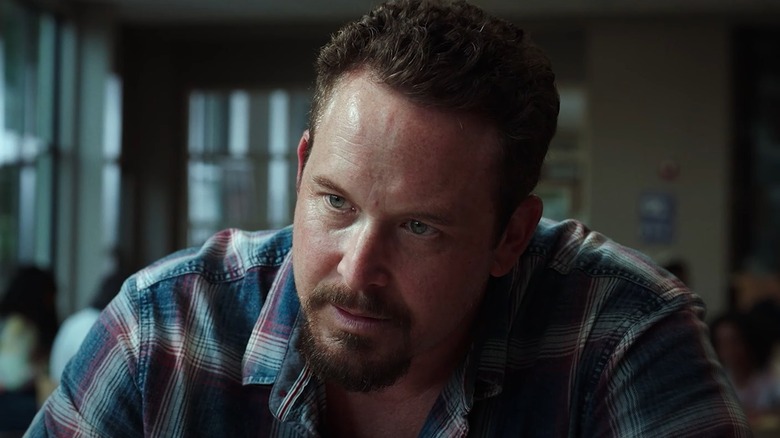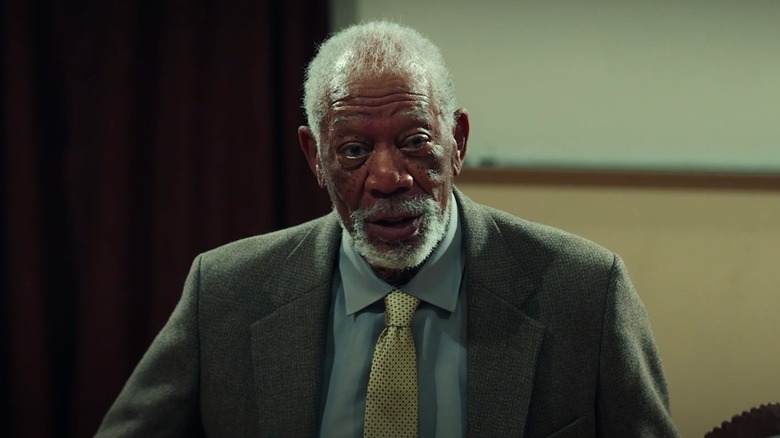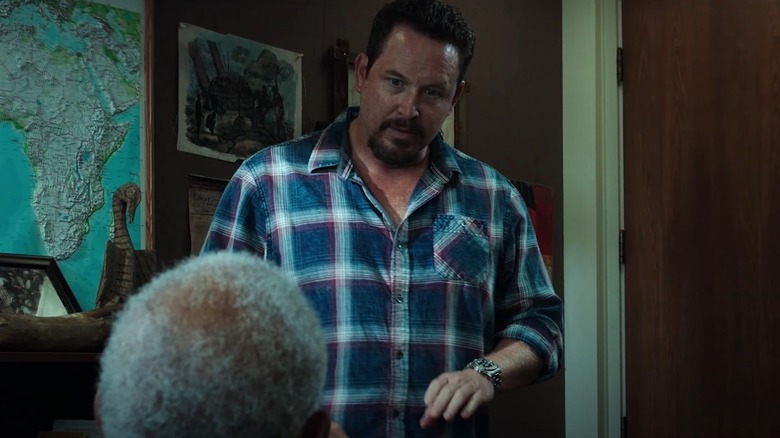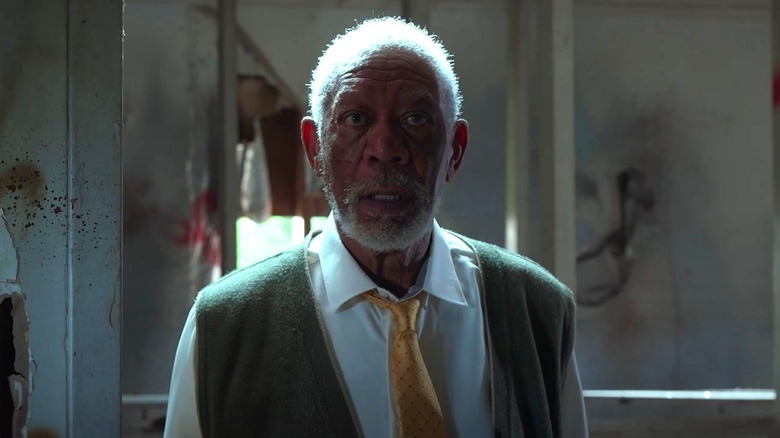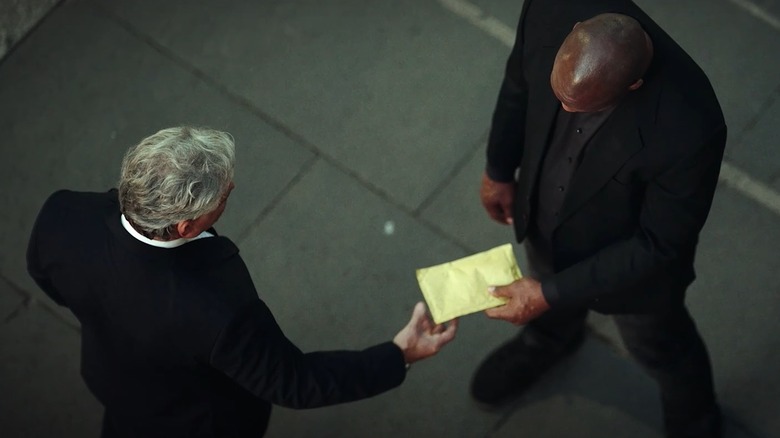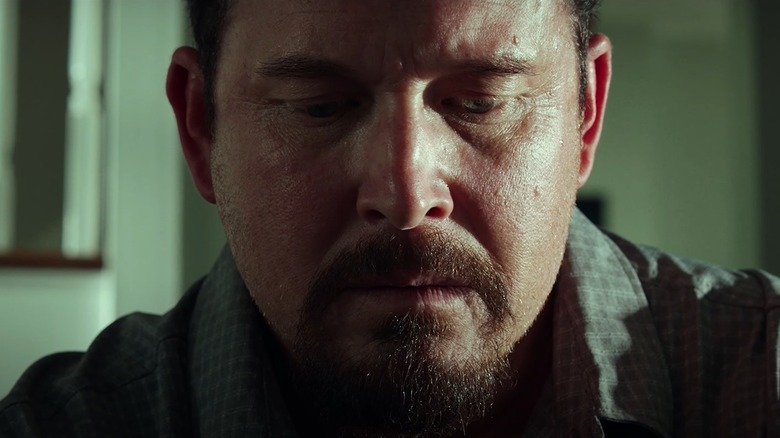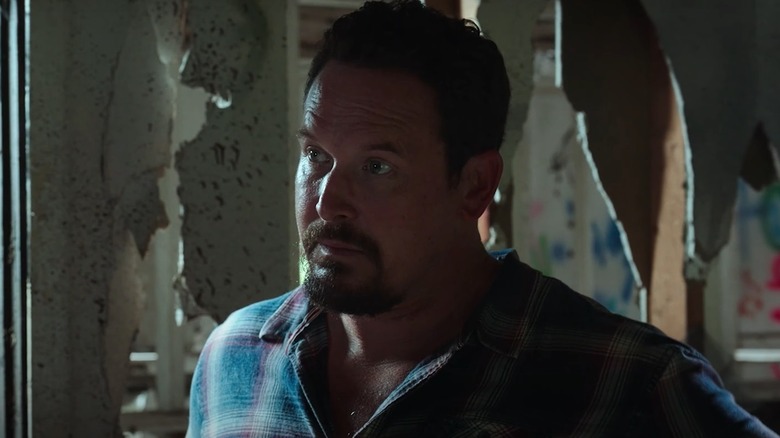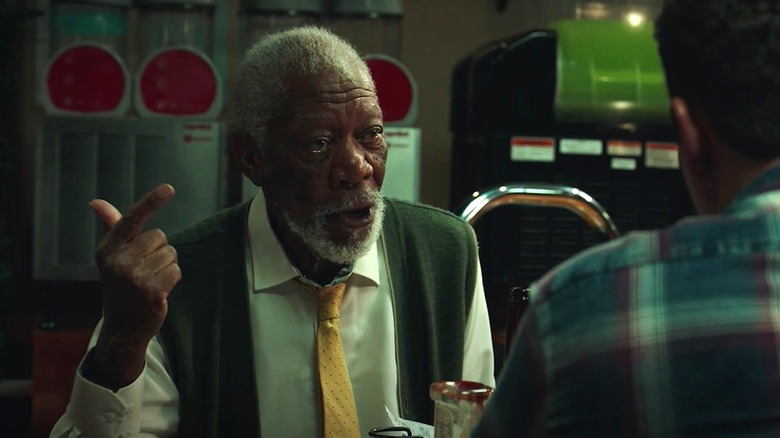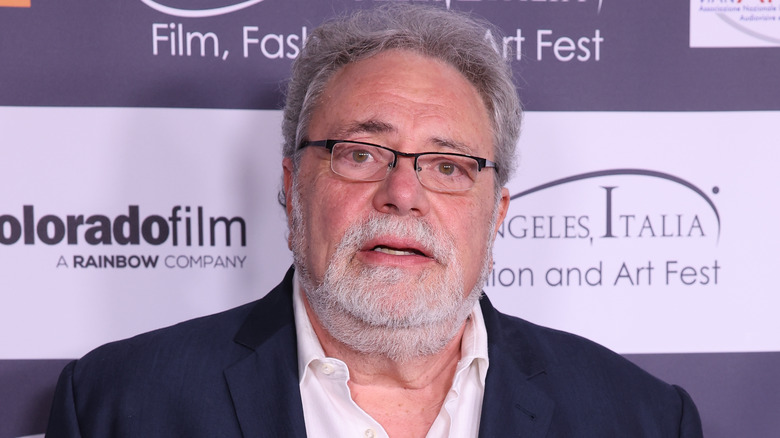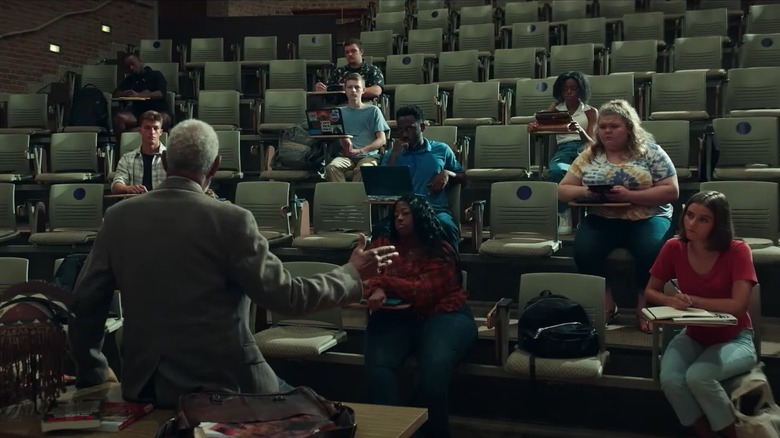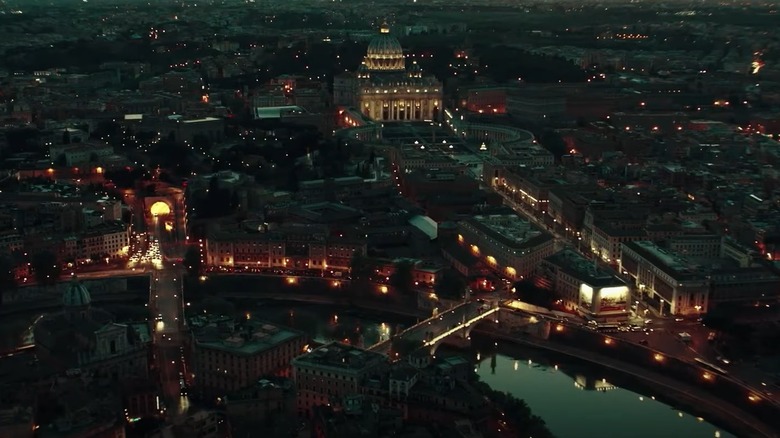The Ending Of The Ritual Killer Explained
"The Ritual Killer" stars Cole Hauser — famous for his role as Rip Wheeler in "Yellowstone" — as homicide detective Lucas Boyd, a lone wolf cop with nothing to lose. Alongside him stands the one and only Morgan Freeman as Dr. Mackles, a professor of African studies well-versed in the cultural meaning of the movie's killings. Together, they must hunt down the murderer and stop him before he kills again, but there's a lot more to this story than meets the eye. Rounding out the main cast is Vernon Davis, an ex-NFL star who plays the movie's antagonist, Randoku.
First announced in 2021, "The Ritual Killer" is directed by George Gallo, who has established a working relationship with Freeman in recent years: They collaborated on 2019's "The Poison Rose," 2020's "The Comeback Trail," and 2021's "Vanquish." All three films were panned by critics, but that didn't stop the pair reuniting for "The Ritual Killer" in 2023. Following the release of the mystery thriller, audiences questioned the movie's bizarre ending. We're here to fill in the blanks in terms of what exactly happens at the end, why the film ends that way, and what the finale could potentially mean for the future of the characters.
What you need to remember about the plot of The Ritual Killer
Like many crime thrillers, the plot of "The Ritual Killer" kicks off with an unsolved murder — or, in this case, multiple murders. A string of killings connected across Italy, Spain, and the southern United States all share a ceremonial element linking them together. When the murder spree rears its head in Mississippi, loner cop Lucas Boyd takes control of the case. In order to track down the perpetrator of the ceremonial killings, Boyd offers to team up with Dr. Mackles, a professor of African studies at a nearby university. Mackles initially hesitates to share his expertise with Boyd and only agrees to help with the case after a second murder happens in Mississippi.
Mackles soon links the murders to the practice of Muti, which is "a form of human sacrifice practiced by some African tribes," per the National Library of Medicine. "The murder is carried out after body parts are removed while the victim is still alive." In Mackles' words, Muti aims to capture life force and energy through harvesting and consuming certain body parts. He identifies the perpetrator of such crimes as a Sangoma, or a witch doctor in Western terms. He also predicts that the murderer has only killed victims thus far to increase his own power levels, meaning that an even more brutal murder ceremony will occur in the near future. That is, unless Detective Boyd and Dr. Mackles can step in and stop it from happening.
What happens at the end of The Ritual Killer?
The ending of "The Ritual Killer" initially appears to be pretty normal by thriller standards. The cops and the audience are privy to the killer's face and name; an evil employer clarifies his motives; and the final ceremony is cut short by Detective Boyd and Dr. Mackles showing up at the perfect moment. However, the story doesn't wrap up at this ceremony. During the final confrontation, Detective Boyd is knocked out from off-screen by Randoku's employer. Dr. Mackles dispatches the evil employer, and then confronts a much younger and physically imposing Randoku. In a weird, hand-to-hand struggle, Dr. Mackles stabs Randoku and saves the day. At the end of the scene, the killer limps away with no chase given.
In the immediate aftermath, Detective Boyd hears from an Italian cop that Randoku learned about Muti from Dr. Mackles around nine months before the start of the killings. Boyd becomes suspicious of Dr. Mackles but cannot find or contact him. During the movie, Randoku gravely wounded Boyd's cop partner, but she is miraculously saved in the hospital by a man who fits the description of Dr. Mackles. With internal confusion about Dr. Mackles' role in the whole saga muddying the waters, Detective Boyd receives a small package containing Randoku's bloody eyeballs and a note saying, "I got him." Detective Boyd then puts on his best "Fear Factor" face, munches on one of the eyeballs, and downs it with a menacing grin as the credits roll.
What does the ending of The Ritual Killer mean?
Throughout "The Ritual Killer," the plot seems straightforward: A reticent specialist teams up with an overeager detective to successfully track down a twisted killer. However, the film's ending requires viewers to recalibrate their thoughts about what actually happened. Was Dr. Mackles in on the murders the whole time? Did Dr. Mackles teach Randoku Muti? And why would Detective Boyd eat Randoku's eyeballs at the end with a menacing grin?
The ending of "The Ritual Killer" points to guilt as an overarching theme of the film. Dr. Mackles did tutor Randoku nine months before the string of murders began. In light of that, his miraculous healing of Detective Boyd's cop partner and subsequent killing of Randoku suggests that Dr. Mackles felt guilty about his role in enabling the murders to happen in the first place.
Meanwhile, Detective Boyd's guilt over the loss of his family and the inadequacies of the criminal justice system provides a viable explanation for why he feels the need to eat Randoku's eyeballs at the end of the film — he thinks he needs better foresight and clarity to prevent and solve crimes going forward, and he wants to be a better man in his personal life.
Why is the movie called The Ritual Killer?
"The Ritual Killer" was initially called "Muti." As previously noted, Muti is an African practice used by warriors and elites who want to become more powerful. Dr. Mackles talks about its history in the movie. He describes it as a tortuous ceremonial process in which body parts are taken from suffering victims — the more screams, the more powerful the magic — and consumed by people looking to enhance themselves in some way. Consuming someone's eyes, he explains, will provide foresight and clarity, hence Boyd's actions at the end of the film.
The film's antagonist, Randoku, is ostensibly the titular killer. He is a trained Sangoma employed by an evil force looking to harvest life energy. However, the twist ending suggests that the film's title might not only refer to Randoku. By the end, Dr. Mackles also proves to be a trained Sangoma who is familiar with and practices certain elements of Muti. Could he be the killer that the title refers to?
Also, the fact that Boyd eats Randoku's eyeballs at the end suggests that he can technically be considered a ritual killer, too. Boyd's willing participation in Muti, paired with his judge-jury-and-executioner style of policing (which led to the death of a suspect at the start of the movie) places him in a morally gray area, similar to Dr. Mackles. The fact that the film was originally called "Muti," something that all the main characters participate in, suggests that all three of them are linked to the title of the film.
What do Detective Boyd's visions mean?
An element of "The Ritual Killer" that doesn't get explained until the very end of the film is why Detective Boyd lost his family. Visions of the past remind him and the audience throughout the film that he recently lost his daughter. By the film's end, Detective Boyd's hazy dreams resolve into complete clarity in order to provide more context for his actions.
In a tragic turn of events, Detective Boyd's daughter drowned while he was supposed to be watching her. Instead, he fell asleep from drinking and did not keep an eye on his daughter, who had seizure problems. In his wife's grief over the loss, she blamed Boyd and took her own life. Interestingly, she apologizes to Boyd in his last vision of her. Whether that is her apologizing from a spirit realm or just Boyd imagining her giving an apology is up to the audience to decide.
In light of that, Detective Boyd's consumption of Randoku's eyeballs at the film's end could signify multiple things. It could mean that Boyd wants to see past the guilt and regret from his past. It could also mean that he is seeking redemption, metaphorically opening his eyes to repair the past that was broken by closing his eyes. If, like Mackles said, eating eyes brings foresight, then Boyd's actions could be him trying to make sure that he never makes such a grave mistake again.
What the ending of The Ritual Killer means for Detective Boyd
As the film's protagonist, Detective Boyd should go through some perspective-altering shifts due to the plot's events. He starts the movie as something of a cowboy cop, someone who is less concerned with the means and more interested in the ends. By the time the credits roll, that core is unchanged. In fact, it is utterly reinforced by his acceptance of the vigilante justice doled out to Randoku by Dr. Mackles and his subsequent consumption of Randoku's eyeballs. He doesn't question for a second whether or not Dr. Mackles took a legitimate route to justice, showing the audience that his flaws from the start of the film are just as apparent at the end.
At face value, Boyd's consumption of Randoku's eyeballs could signify his desire to become a more powerful version of himself and, perhaps more importantly, a more powerful detective. It also suggests that Detective Boyd is willing to cross normal boundaries to achieve what he thinks is right — an ultimate affirmation of the whole "the ends justify the means" approach to police work that he takes. As such, there is a valid argument that Detective Boyd tragically ends the movie in a worse state than he begins. In any case, the ending definitely suggests that Detective Boyd has a super strong stomach.
What the ending of The Ritual Killer means for Dr. Mackles
During the film, Dr. Mackles is always presented as the person who truly knows what is going on. He is the established authority for an arcane process and seemingly knows the killer's intentions based solely on the manner of the murders. His trustworthiness builds throughout the movie and is apparently confirmed near the end: It becomes clear that Mackles is the one who miraculously healed Detective Boyd's cop partner in the hospital, and he also dispatches Randoku during the final confrontation. However, Dr. Mackles is also the one who throws the big curveball right at the end, disappearing from contact and sending Boyd Randoku's eyeballs.
Based on the end of the film, Dr. Mackles is clearly a powerful Sangoma himself. His ability to physically defeat Randoku during the film's final confrontation, as well as track him down and murder him, is very surprising, considering Dr. Mackles is an elderly professor and Randoku is a young, international murderer (played by an ex-NFL player). He couldn't have done this without a supernatural boost. However, with everything considered, it does appear that Dr. Mackles felt bad about Randoku's killing spree and decided to end it using his own special powers. Does this mean he's seen the error of his ways and will stop practicing Muti? Judging by the fact that he sent Randoku's eyeballs to Boyd, the answer to that question is probably no. Like Boyd, Mackles doesn't really learn anything from his mistakes, a clear theme in "The Ritual Killer."
What has director George Gallo said about The Ritual Killer's ending?
George Gallo is a writer and director mostly known for his contributions to the comedy genre, with films like "Midnight Run" on his impressive writing resume. "The Ritual Killer," a cat-and-mouse murder thriller, isn't exactly in his wheelhouse. He described his initial reservations about directing the movie to Screen Rant, saying, "Because of my background, I came from mostly comedies, this is a big stretch for me, and I read it, and my first instinct was, 'Man, I don't want to do this, this is just effed up, I don't want to do it.'" After some friendly encouragement from friend and frequent collaborator Morgan Freeman, however, Gallo agreed to shoot the film.
Gallo went on to say that he "didn't want to make an overly stylized thriller." In line with this, Gallo's characters are not the kind you find in easily digestible, hyper-stylized thriller flicks. They are, instead, human characters with muddy moral compasses. The ending of the film makes a bit more sense in that morally-gray framework set up by Gallo. He explained, "I was saying that a very damaged, crazy human being was chasing another evil person, and they're both sort of evil in different ways to me, so I thought that was interesting." This understanding gives credence to the idea that maybe Randoku isn't the only ritual killer in the movie.
What have audiences and critics said about The Ritual Killer's ending?
It's safe to say that "The Ritual Killer" is a flop in terms of the reviews. On Rotten Tomatoes, the film has a measly 10% critic score and doesn't fare much better with viewers, with an audience score of just 19%. While the movie as a whole is poorly regarded, the ending, in particular, caused lots of confusion and bewilderment. "Muddled, vaguely irritating, and somewhat offensive, this un-thrilling thriller moves lifelessly through its story and has a bizarre head-scratcher of an ending," said Common Sense Media, while Flickering Myth said, "'The Ritual Killer' starts offensively bad but somehow continues to dig a bigger hole from there until its asinine, idiotic ending."
Fans were just as baffled by the ending of the film. In a Reddit thread titled "'The Ritual Killer' was so much worse than I expected," users vented about the bizarre final moments of the movie. U/doodler1977 said: "He eats the eyes, so...now he has 'the power' – to do WHAT? Also, are we supposed to think Morgan Freeman freed the girl? or killed her? the edit is sooooo confusing." Fellow Redditor u/beefbarleyrules was just as thrown by the ending. "Why the f*** did he eat the eyes? (not symbolically, I mean why was he expecting eyeballs in the mail to eat essentially)," they wrote. "Why was Mackles the one who got the killer? When it made it seem like he and Randoku (spelling?) were working together???"
What the ending of The Ritual Killer could mean for a potential sequel
The surprise ending of "The Ritual Killer" leaves the door open for more movies. The most obvious approach would be to continue Detective Boyd and Dr. Mackles' relationship. By the end of the film, it appears as though their relationship is over, with Dr. Mackles cutting off all contact. But, a sequel could reopen that door, and it would make sense that Detective Boyd would want to maintain contact with Dr. Mackles after willingly accepting his Muti gift. Detective Boyd and Dr. Mackles could team up as anti-hero vigilantes and become Muti-wielding detectives in a potential sequel.
While the Italian subplot is somewhat baffling and unnecessary, it does provide an avenue to continue the story abroad, perhaps with a new Muti practitioner. At just the correct times during the film, an Italian cop calls Detective Boyd and provides crucial information. Could this cop be the star of a sequel film? Another potential direction is a Dr. Mackles origin story. When did he learn about Muti? How did he become a powerful practitioner? Does he have any other protegees? The ending of "The Ritual Killer" definitely leaves the door open for more Muti shenanigans, though — unless the film goes on to become a cult favorite — more movies in this universe are unlikely.
